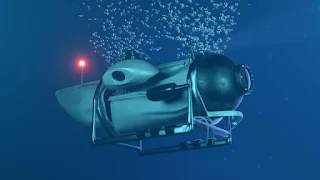The Titan submarine dominated the headlines in the summer of 2023, following the explosion that killed five people, and this incident is still revealing new information until now.
One expert claimed that the ill-fated submarine may have exploded in June last year due to a so-called "micro-dent" in its carbon fiber hull.
Buckling, or buckling, is the sudden collapse of a structural element subjected to high compressive stress.
The submarine suddenly disappeared when it was heading to the wreckage of the Titanic at a depth of 12,500 feet below the surface, on July 18, and it became clear, after global efforts to search for it, that it exploded a few hours into its journey, leading to the death of all passengers, namely the British billionaire Hamish Harding (58 years old). ), Shahzada Daoud (48 years old), and his son Suleiman Daoud (19 years old), who are of Pakistani origin, and the French Navy pilot Paul-Henri Narjolet (77 years old), and the CEO of OceanGate company organizing the trip, Stockton Rush.
Now, new research offers a new theory about exactly what went wrong, which confirms what we've known all along: that the submarine was essentially designed from the beginning to explode.
Researchers from the University of Houston and the University of Minnesota suggest that a "micro-dent" in Titan's structure may have been the catastrophic catalyst that caused it to collapse under pressure.
Roberto Ballarini, research leader and professor of civil and environmental engineering, said: “Titan’s safety may have been compromised due to damage to the materials used in its structure that accumulated during the many flights it made before the collapse. The material used in Titan’s structure was a carbon fiber composite.” It is known that under stress loading, the fibers in such composites are susceptible to micro-buckling and may separate from the surrounding matrix.”
He continued: "If Titan's hull had been subjected to such damage under extreme pressures during diving, its rigidity and strength would have been significantly reduced, along with the inevitable engineering defects that appeared during its manufacture, which may have contributed to its internal collapse caused by buckling."
With the help of computer simulations, the researchers predicted the average twisting strength of the crust containing the defects, which may unravel the mystery surrounding Titan's sudden buckling and instantaneous implosion.
So, as it turns out, building a submarine out of carbon fiber was a bad idea after all.
The research paper was published in the academic journal Proceedings of the National Academy of Sciences.
Tags:
carbon fiber
houston university
killed passengers
micro dent
minnesota university
new reason
science
titan submarine
titanic tragedy


Supar
ReplyDeleteWith the help of computer simulations, the researchers
ReplyDeleteGood
ReplyDeleteGud
ReplyDeleteGood
ReplyDeleteResearch indicates that a "micro-dent" in the Titan submarine's carbon fiber hull may have caused its fatal implosion, revealing design flaws and material weaknesses contributing to the tragedy.
ReplyDeleteGood
ReplyDeleteGood
ReplyDeleteGood
ReplyDeleteGood
ReplyDeleteGood
ReplyDeleteInformative
ReplyDelete